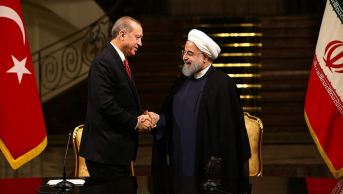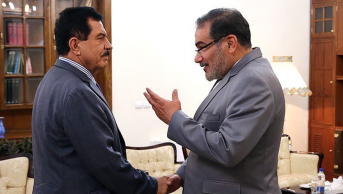The Second Term of President Rouhani

Having won the 12th presidential election held on May 19 bygarnering 57% of the votes, Hojatoleslam Hassan Rouhani received official approval of Supreme Leader Ayatollah Ali Khamenei in the last week. And then, attending in swearing-in ceremony at Islamic Consultative Assembly, he has begun his second term as president of the Islamic Republic of Iran. Considering his election promises and political balances in the country, Rouhani was expected to make some changes in the cabinet for his second term. He had more than two months to put together his cabinet and conduct those changes.
Pressures on Rouhani during the Formation of the Cabinet
While preparing his new cabinet,President Rouhani faced some pressures from different segments of society and various political factions. Tensions rose between Rouhani and hardliners /conservatives who threatened Rouhani with Bani Sadr's fate. Bani Sadr was the first president of Iran who had to flee the country before completing his second year in office even though he had won 70% of the popular vote. Rouhani's brother was arrested for alleged corruption files. Likewise, the hostility between Rouhani's team and Revolutionary Guards has come to a head.
Additionally, reformist groups that supported Rouhani through the elections, pressured on himto coordinate the formation of cabinet and allocatea considerable number of ministerial seats to their fellows. Women organizations also launched a campaign to have women in the future cabinet. Former President Ahmadinejad had previously paved the way for women to be in the cabinet by appointingMarziyeh VahidDastjerdi as Minister of Health in his second cabinet.During his election campaign Rouhani underlined gender equality and women's rights and thus encouraged the movement to demand higher roles in the government. Thus, women's rights groups led campaigns to force President Rouhani, who selected three women as vice-presidents in his first term, to assign women as ministers. Meanwhile Vice President for Women and Family Affairs ShahindokhtMolaverdi stated she would not continue her job in the office if there were no women ministers. The parliament also supported the women's rights movement and 175 MPs signed a joint statement to have women appointed as ministers.
The biggest pressure that Rouhani faced, while picking his cabinet members, came from Supreme Leader Khamenei. Even though Khamenei has no authority over forming the cabinet, it has become a custom for presidents to get their cabinet members approved by Khamenei both as a matter of courtesy and also because it makes it easier to defend their choices. It was claimed that Rouhani and Khamenei had serious disputes over picking figures as ministers. Later on, the office Khamenei issued a statement confirming the authority of president to form his cabinet.However, it also indicated that Khamenei has been especially interested in selection of ministers for Foreign Affairs, Defense and Intelligence becausetheir operations fall to the jurisdiction of Supreme Leader. Additionally, it is thought that Rouhani looked for the consent of Khamenei for some other ministers because he used to criticize performance of government on economy, education and culture during his first term.
New Cabinet of Rouhani
Considering the wishes of Supreme Leader, current political situation in the country, Rouhani was expected to form coalition government with many technocrats. In fact, he heldnumerous meetings with many people from the both sides of political spectrum, and high-ranking commanders of the Revolutionary Guards. Finally, he made the final version of the cabinet members' list and presented it to the approval of parliament on August 8.
According to the constitution of Iran, the ministers are answering both the parliament and the President. Profile and quality of people nominated by president to oversee ministries are reviewed in the parliament; only those approved by the parliament takeover ministerial seats. The parliament is to review the nominees during the next week. This process is expected to be passed relatively smooth because the majority of the deputiesare considered to be pro-Rouhani. Notwithstanding, it is likely that some heated debates take place since the parliament reviews proposed ministers and their projects one by one.
EshaqJahangiri, who ran in the elections but then withdrew in favor of Rouhani, maintains his position as the vice president. Rouhani proposed 17 ministers, and excluded Ministry of Science, Research and Technology. Ministry of Science is one of the most controversial ministries as the office-holder appoints university rectors. It is claimed that the office is currently left empty because of the disagreement between Rouhani and Supreme Leader Khamenei. Accordingly,eight out 17 seating ministers arereplaced. Foreign Affairs Minister Zarif, Interior Minister Abdol-Reza Fazli, Intelligence Minister Mahmoud Alavi, and Petroleum Minister BijanNamdarZanganeh maintained their positions.
One of the most interesting changes in the cabinet took place with related to the Ministry of Defense. Officers from the Revolutionary Guards were used to assume this post since 1993, however, for the first time President Rouhani has selected an officer from the army (artesh) to manage defense portfolio. Brigadier General Amir Hatami, former Deputy Defense Minister, has been proposed as the Minister of Defense. Thus, the Revolutionary Guards was not able obtain a post in the cabinet for the first time since the 1980's.
Another significant changewas about economy. Masoud Karbasianreplaced Ali Tayyeb-Niaas the proposed minister for Economic Affairs and Financein the 12th government.Karbasian previously served as a deputy minister at various ministries including Economic Affairs, Industry, Mining and Trade; and he is also known for his studies on globalization.
There are three controversial figures in the proposed cabinet. The first one is SeyedAlirezaAvaie who is proposed as Minister of Justice. It is claimed that, while he was a prosecutor in Dezful,he Avaie took part in the controversial executions of regime's opponents in 1988. Avaie, who was the head of Tehran Justice Administration from 2005 to 2014, is also added in the sanctions list of EU for alleged human rights violations. The second controversial figure is Mohammad Javad Azari Jahromi, 36, the youngest person in the proposed cabinet in order to seat as the Minister of Communications and Information Technology instead of Mahmoud Va'ezi. Jahromi is claimed to be responsible of the surveillance of online networks at the Ministry of Intelligence under former president Ahmadinejad. As for the proposed Minister of Energy,HabibollahBitaraf, he took part in the occupation of U.S. Embassy taking American diplomats hostage in 1979.
Most of the ministers in the new government of Rouhani are technocrats. Some of them, Minister of Social Welfare Ali Rabi'ee, Minister of Energy HabibollahBitaraf, and Minister of Petroleum BijanNamdarZanganeh, previously served as ministers under Khatami governments.However, a few of them have political careers and affiliated with political parties (BijanNamdarZanganeh - Kargozaran Party, Minister of Youth Affairs and Sports MesudSoltanifar - National Trust Party, Minister of Agriculture Mahmoud HojjatiNajafabadi - Islamic Participation Party. According to laws in Iran, Minister of Intelligence has to be a faqih (religious jurist). Current Intelligence Minister Mahmud Alavi, who was reinstated to his position, claims to be politically impartial. Minister of Interior Abdol-Reza Rahmani Fazli is known to be close withAli Larijani, Speaker of Parliament.
Despite all the pressures, there is no woman in the new cabinet. Rouhani assigned two women (MasumeEbtekar and Laya Joneidi) as Vice President for Women and Family Affairs and Vice President for Legal Affairs. Molaverdi is appointed as an advisor about Citizenship Rights.
Rouhani'sproposed list for the new cabinet disappointed both his female supporters and the reformists. Considering the distribution of seats in the parliament, this may not create a problem for Rouhani to get approval for his. However, if Rouhani won't take steps to compensate anticipations of the reformists and women's rights movement’s, the implicit coalition between technocrats and reformists may begin to dissolve in the mid run. The exclusion of Revolutionary Guards from the cabinet is a step forward for civilianization of politics. However, it is likely that the Revolutionary Guards, through their political alliances,would challenge President Rouhani in order to protect their interests invested in the system, which may raise new debates on civil-military relations. In his second term as president, Rouhani will focus on economic reforms. In this respect he is expected to avoid new crises in foreign policy, take steps to support economy, and persist on his discourse on constructive interaction, dialogue and cooperation. Still, this won't make much difference to Iran's policy towards the Middle East. Similar to his first term, Rouhani is expected to focus on economic policies and economic relations in his second term, and leave the management of existing crises in the Middle East to the Revolutionary Guards.










